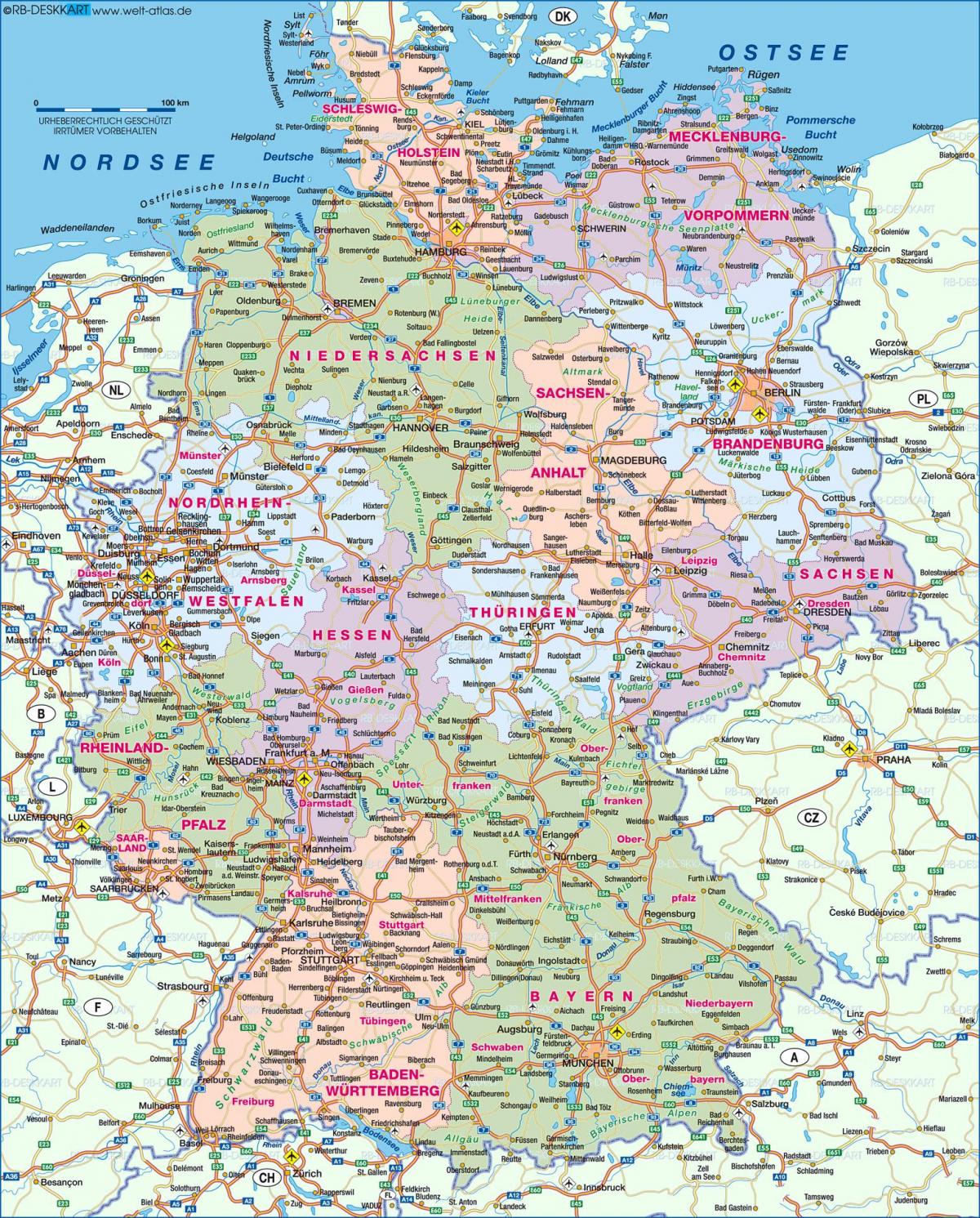search
Germany map
Show me a map of Germany. Germany map (Western Europe - Europe) to print. Germany map (Western Europe - Europe) to download. A region named Germania, inhabited by several Germanic peoples, was documented before AD 100 as its mentioned in Germany map. During the Migration Period, the Germanic tribes expanded southward, and established successor kingdoms throughout much of Europe. Beginning in the 10th century, German territories formed a central part of the Holy Roman Empire. During the 16th century, northern German regions became the centre of the Protestant Reformation while southern and western parts remained dominated by Roman Catholic denominations, with the two factions clashing in the Thirty Years' War, marking the beginning of the Catholic–Protestant divide that has characterized German society ever since.
The English word Germany derives from the Latin Germania, which came into use after Julius Caesar adopted it for the peoples east of the Rhine as its shown in Germany map. The German term Deutschland (originally diutisciu land, "the German lands") is derived from deutsch, descended from Old High German diutisc "popular" (i. e., belonging to the diot or diota "people"; originally used to distinguish the language of the common people from Latin and its Romance descendants). This in turn descends from Proto-Germanic *þiudiskaz "popular" (see also the Latinised form Theodiscus), derived from *þeudō, descended from Proto-Indo-European *tewtéh₂- "people".
Germany has a civil law system based on Roman law with some references to Germanic law. The Bundesverfassungsgericht (Federal Constitutional Court) is the German Supreme Court responsible for constitutional matters, with power of judicial review. Germany supreme court system, called Oberste Gerichtshöfe des Bundes as you can see in Germany map, is specialised: for civil and criminal cases, the highest court of appeal is the inquisitorial Federal Court of Justice, and for other affairs the courts are the Federal Labour Court, the Federal Social Court, the Federal Finance Court and the Federal Administrative Court. The Völkerstrafgesetzbuch regulates the consequences of crimes against humanity, genocide and war crimes, and gives German courts universal jurisdiction in some circumstances. Criminal and private laws are codified on the national level in the Strafgesetzbuch and the Bürgerliches Gesetzbuch respectively.
Germany has a network of 229 diplomatic missions abroad and maintains relations with more than 190 countries. As of 2011 it is the largest contributor to the budget of the European Union (providing 20%) and the third largest contributor to the UN (providing 8%). Germany as its mentioned in Germany map is a member of NATO, the Organisation of Economic Co-operation and Development (OECD), the G8, the G20, the World Bank and the International Monetary Fund (IMF). It has played a leading role in the European Union since its inception and has maintained a strong alliance with France since the end of World War II. Germany seeks to advance the creation of a more unified European political, defence, and security apparatus.
Germany military, the Bundeswehr, is organized in Heer (Army), Marine (Navy), Luftwaffe (Air Force), Bundeswehr Joint Medical Service and Streitkräftebasis (Joint Support Service) branches as its shown in Germany map. As of 2011, military spending was an estimated 1.3% of the country GDP, that is low in a ranking of all countries; in absolute terms, German military expenditure is the ninth-highest in the world. In peacetime, the Bundeswehr is commanded by the Minister of Defence. If Germany went to war, which according to the constitution is allowed only for defensive purposes, the Chancellor would become commander in chief of the Bundeswehr. As of March 2012 the Bundeswehr employs 183,000 professional soldiers and 17,000 volunteers. The German government plans to reduce the number of soldiers to 170,000 professionals and up to 15,000 short-time volunteers (voluntary military service).


